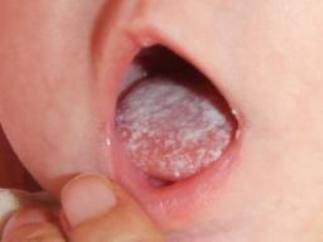
Oral thrush is a fungal infection that affects the mouth and is quite common in young children and babies. While it is harmless, oral thrush in babies affects about 5% of all newborns and one in every seven in the fourth week of birth. After the fourth week, it is very rare for your baby to develop oral thrush. Nevertheless, thrush is very easily treatable as you will see below.
What Are the Symptoms of Oral Thrush in Babies?
Oral thrush in babies is characterized by several white patches or spots in and around the mouth. Sometimes, your baby may develop cream or yellow patches that look like cottage cheese or curd. These patches can also join together to form larger plaques. Patches may appear on your baby’s gums, inside their cheeks, or on the roof of their mouth. These patches do not rub or wash off easily and will appear red and raw underneath. While they may not bother your baby, they can at times be sore and interfere with feeding. Other symptoms of oral thrush in babies include:
- Saliva with whitish sheen
- Fussiness when feeding
- Clicking sounds when feeding
- Poor weight gain
- Nappy rash
- Dribbling more saliva than normal
Why Does My Baby Develop Oral Thrush?
Oral thrush in babies is a result of fungus which is known as Candida albicans. Everybody has this fungus in their body, and it lives in balance with other organisms. If the balance of organisms in your baby’s body is upset, the thrush organism multiplies and produces an infection. It can happen after putting your baby on antibiotic treatment as it affects the balance of bacteria in their body.
Your baby can also get thrush after sucking on thrush infected objects. This can be teats, dummies or even nipples. They can also pick up thrush during the birth as they pass through the vagina. If your baby has a weak immune system or uses inhaled steroids, e.g. those for asthma, they will be more susceptible to thrush infections
How Is Oral Thrush in Babies Treated?
If you doctor feels that there is a need to treat your baby’s thrush, they will prescribe antifungal medicines, such as nystatin and miconazole. Normally, you will have to give your baby the medication for up to four times every day after meals. Once the infection has cleared up, continue giving your baby the medication for 2 more days to ensure the infection does not recur. If after a week of treatment your baby’s thrush has not cleared, let your doctor know.
Is There Anything I Can Do to Prevent It?
While it is not clear whether you can prevent oral thrush in babies, some doctors recommend the following:
- Clean pacifiers and nipples in hot water after use if you are formula feeding your baby. This ensures that any yeast on the pacifier or nipple does not re-infect your baby. You should also store milk and prepared bottles in the fridge to prevent the formation of yeast.
- Check your nipples before breastfeeding. If you normally breastfeed your baby, you should check to ensure that your nipples are not red and sore. This is a sign of yeast infection and you could easily pass it on to your baby during feeding. Talk to a doctor if you suspect you have an infection. They should prescribe an antifungal ointment for your nipples.
It is important to note that some babies are more prone to thrush than others. If you suspect your baby is vulnerable, you should do the following in addition to the above to prevent oral thrush in your baby.
- Clean and sterilize bottles, feeding equipment, dummies and other toys.
- Wash the baby’s clothes with hot water about 140 degrees F (60 degrees C).
- Change diapers frequently.
- After changing your baby’s nappy, wash your hands thoroughly.
Suggestions for Breastfeeding Mums
It is possible for your baby to pass a thrush infection to you. This can affect your breasts and nipples. Some of the symptoms of nipple thrush include pain when breastfeeding, sensitive nipples, and changes in the color of your areolas.
If you have thrush in your nipples, you should continue breastfeeding your baby while using antifungal cream. Apply the cream after every feed and wash it off before feeding the baby. If the nipple thrush is severe, your doctor may recommend antifungal tablets.